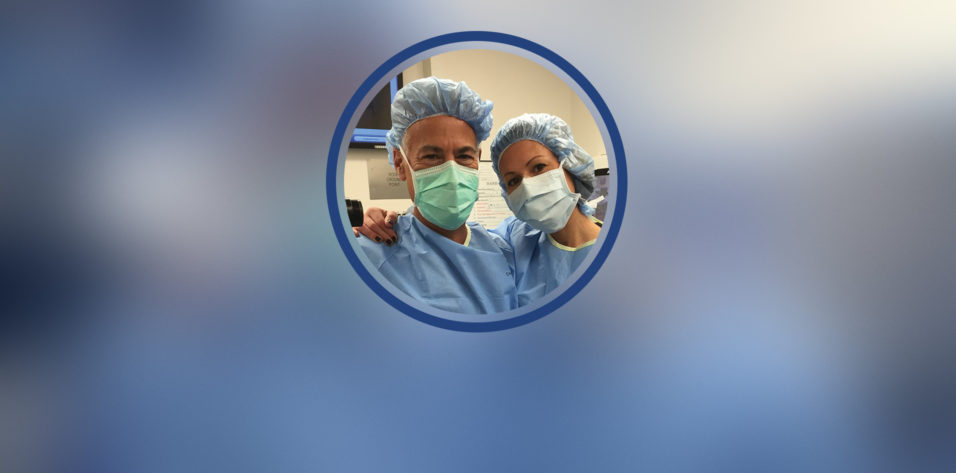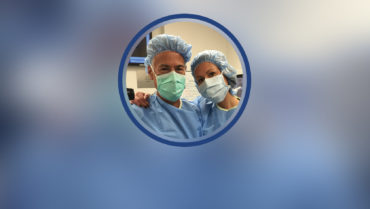A Father’s Shadow
By Randy J. Epstein, MD
I appreciate having the opportunity to share with the readers of CRST my thoughts and experience of having a daughter who is currently in ophthalmology residency training. Writing this article has helped me to crystallize my own thoughts on this matter and to better appreciate some of the issues involved.
I have always tried to encourage my children to make their own choices regarding their career paths, but I have to say that Rachel’s choice to go into ophthalmology has meant more to me than I could ever have imagined. It tells me a lot about my ability to convey the excitement and passion I feel for my profession.
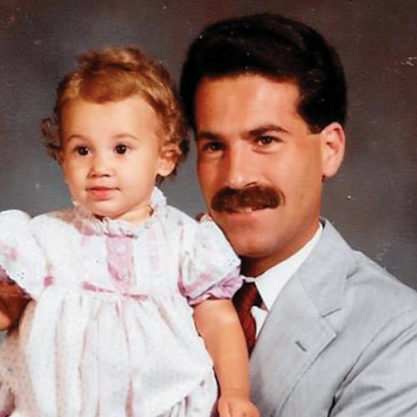
Figure 1. 1984: Randy and Rachel.
Although I have never consciously tried to act as a role model, I have been informed by my children that they have viewed my conduct in this context, to some extent. During Rachel’s medical school experience, I encouraged her to take a close look at as many areas of potential specialization as possible and to look more seriously at a few. In the end, she tells me, it was her experience shadowing me in the OR that provided her with the final catalyst to make the decision to pursue ophthalmology. It probably did not hurt that she has been watching me watch and edit surgical videos at home since she was a child.
FIT FOR A MENTOR
I have been proud to offer my services as a mentor when appropriate. While Rachel was still in college, she helped to coauthor a paper that she was then able to watch presented by one of our fellows at a subspecialty meeting before the American Academy of Ophthalmology Annual Meeting. She has strolled through the exhibit halls with me at that meeting, and at the American Society of Cataract and Refractive Surgery meeting, and she has attended cornea subspecialty group meetings with me. She has also had the opportunity to watch me present at local and national ophthalmology meetings.
The dynamics of working together have been interesting. She is currently a second-year ophthalmology resident at Rush University Medical Center in Chicago, where I am actively involved in the teaching program. We both try hard to keep our work relationship professional and to respect boundaries. We also try not to let our shop talk dominate all of our conversations during family and social events.
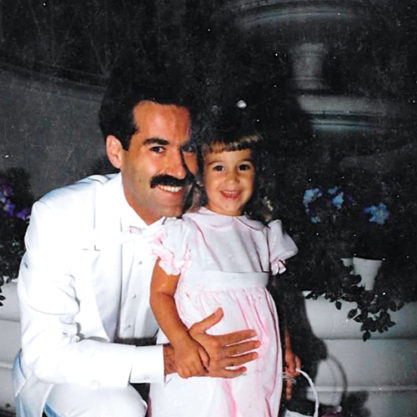
Figure 2. 1986: Randy and Rachel at a wedding.
Working together so closely (and having trained in the same program), I have a pretty good handle on many of the situations she is facing, the personalities she is interacting with, and the institutional issues involved. I attempt to provide her with some insight that may be helpful in navigating office politics and other sensitive areas. Our main challenge is trying to continue to enjoy each other’s company as a father and daughter, stepping out of our roles as student and teacher.
MUTUAL LESSON-LEARNING
We have both taught many things to each other and learned many things from each other. She has taught me the importance of being patient with my trainees, including being sensitive to the many pressures they now face—some of which were nonexistent when I was in training. I have learned just how difficult it is to juggle the many responsibilities and stresses residency trainees now face on a daily basis.
My proudest moments come from watching Rachel interact with her patients, as she demonstrates compassion, wisdom, and competence. I also very much enjoy watching her deliver scientific presentations (during which I am bursting with pride) at conferences ranging from departmental grand rounds to paper presentations at the American Society of Cataract and Refractive Surgery meeting. I enjoy discussing contemporary issues affecting our field, and I enjoy benefiting from the differences in perspective that we bring to these discussions. I look forward to many more of these moments in the future.
My Father’s Daughter
By Rachel Epstein, MD
If you are lucky, as a child, you have a steadfast role model in the form of a parent (Figures 1 through 4). My father has always been an inspiration to me, yet I only recently appreciated how pervasively ophthalmology permeated my childhood and, ultimately, affected the course of my life. My siblings and I unknowingly contributed to the success of our father’s weekend call schedules by keeping ourselves busy playing dress-up in dad’s spare white coats and exploring the fun tools around the office while he dealt with various urgent issues between weekend errands and activities.
STYROFOAM CONTAINERS AND EYEBALLS
I remember that, almost every night, my father would stay up late in his basement office completing charts, reading, and reviewing medical journals. Sometimes, I would crawl into bed for our very own home surgical video screening. I can even recall his using our spare basement refrigerator to keep extra culture medium and occasionally Styrofoam specimen containers, which my sister and I were convinced must be harboring dozens of eyeballs. His unyielding dedication to his work, to his patients, and, ultimately, to his family was astounding.
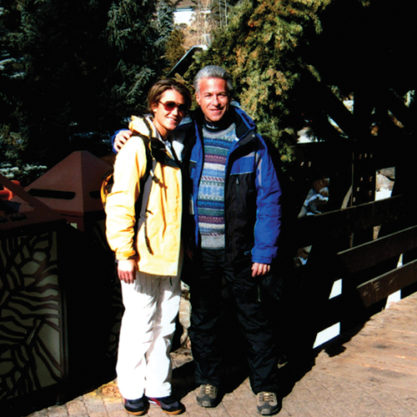
Figure 3 . Randy and Rachel in Vail, Colorado, at the Colorado Ophthalmology Society meeting.
Throughout my childhood and adolescence, and even now as an adult, I have witnessed and experienced the many challenges and the numerous rewards of a life in medicine. For a while, I believed I was not right for the job of physician, that the profession would not suit me, but I think I was more just scared that the profession would not have me. I finally made the decision to become a doctor just months after earning my Bachelor of Arts in English. I returned to school to finish my prerequisites, and within a few years, I was a first-year medical student.
HOOKED ON OPHTHALMOLOGY
I knew almost immediately after starting my clinical rotations that I wanted to be a surgeon. I wavered on the particular field I would go into for a while, thinking I would favor a road untraveled by my father. However, I was fortunate enough to spend a few days shadowing him over winter break of my third year. After the final few passes, securing host and donor cornea for a penetrating keratoplasty, I was hooked, and I resolved to become an ophthalmologist.
There are pluses and minuses to having such a prominent family member in the same field. However, I do not see my father’s career as a measure to gauge my own success but rather as a framework delineating how to achieve greatness. The single most important factor is an unyielding commitment. I likely will not face the same challenges he faced starting out, but I will have my own. With that said, becoming a physician is a truly singular experience that we can share, and having a role model and a colleague to commiserate with makes all the difference.
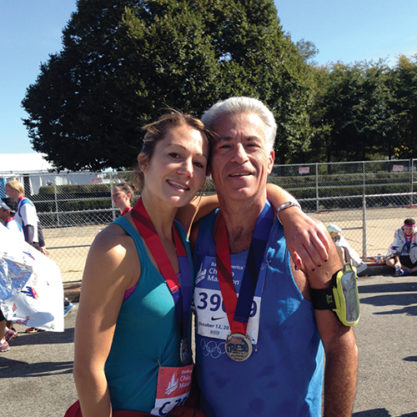
Figure 4. 2014 Chicago Marathon finish line: Rachel had coached Randy through the final 16 miles.
I have always been so proud to be able to identify myself as my father’s daughter, but I have gained an even greater appreciation of how amazing he truly is through our work together. His patients trust and respect him, so even when dealing with less-than-desired outcomes, they can work together rather than in opposition. He has taught me how to truly treat patients, beyond treating their particular disease processes. As we work to help them through the process of improving their vision, it is crucial to help them feel better as well.
Thus far, I have found my dad to be a nonjudgmental, seasoned physician with whom I can unabashedly discuss clinical, professional, and even personal issues. He has been one of the greatest resources for me as a medical student and resident, and he certainly will continue to be in the future when I am in practice. Working with him in the resident clinic and in the OR has been a tremendous experience. Under his guidance, I got to throw my first corneal transplant sutures, perform my first initial phaco steps, and deliver my first lens. He is helping me become a better clinician, a better surgeon, and a better provider. In return, I hope I am helping him become a better teacher—and eventually transitioning his penetrating keratoplasty technique to slip-knotted sutures.
TWO EPSTEINS IN THE CLINIC
Recently, we had a notably successful shared venture. A previous patient of his happened to present as an urgent walk-in on my call day. This patient had a rather complex history of contact lens-related keratopathies, and she had an acute flare-up that we appropriately recognized as likely herpetic in nature. When the patient returned for follow-up, intentionally, it was on the 1 day per month my father staffs the resident clinic. The patient was so pleased with our rapport and how comfortable she was with the care she received that, when she made her follow-up appointment, she insisted it should again be on the single day that both Epsteins were in clinic.
If you are lucky, you get to witness a parent’s involvement in endeavors that seem to transcend everyday ritual. Seeing my father at work, in every facet, has truly been life-changing for me.

